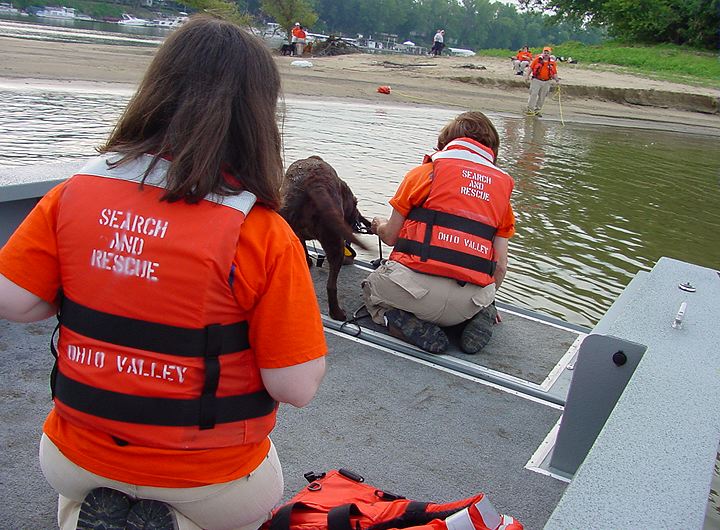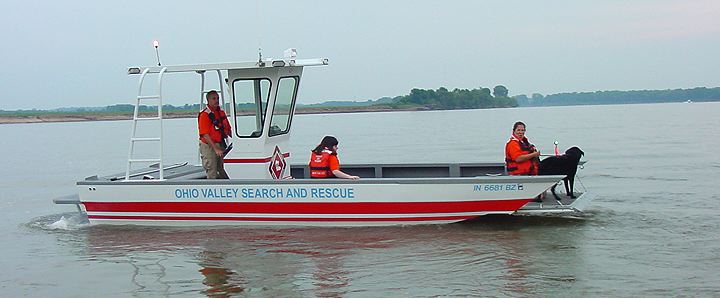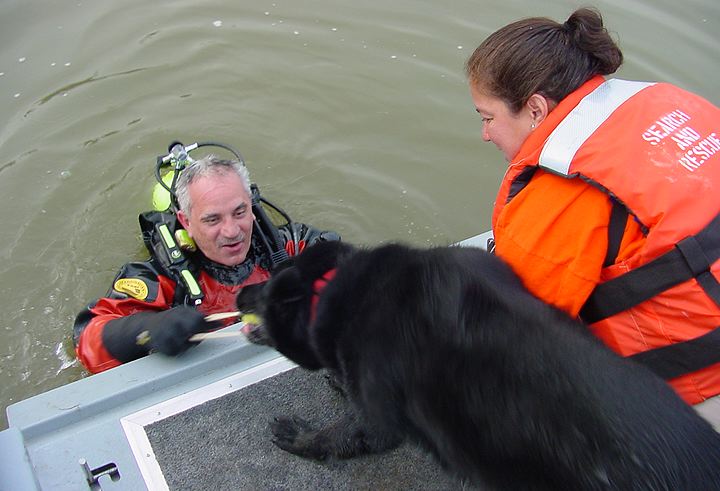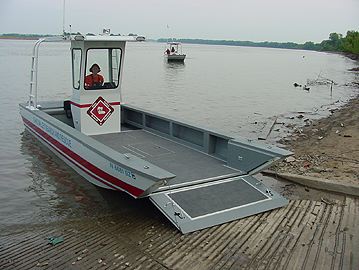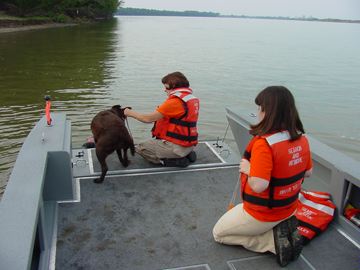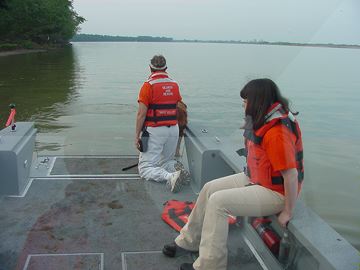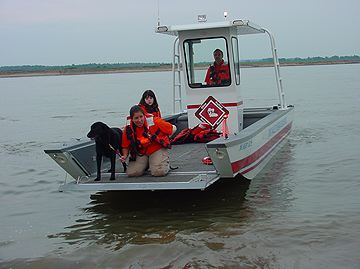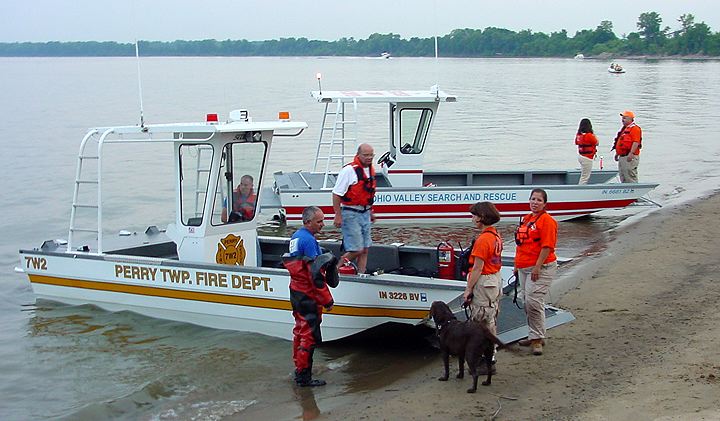During
water searches the scent is carried to the surface as it travels according
to water temperature, water depth, and air current. The search dog will
alert when he finds the scent. Dogs usually work from a boat but can also
work from shore. When working from a boat they usually work from the bow
of the boat.  The
boat can travel back and forth from shore to shore. Keeping in mind the
wind direction and other weather conditions such as sun reflection, temperature
and currents of the water can affect the way the search is conducted. An
alert from the search dog makes the handler aware and the rescue divers
evaluate where to dive. It is just as important to know where not to dive.
If you can determine where the victim isn't then you have valuable information,
especially when you are searching a large area of water. In searching the
water, the dogs can only detect where the scent is emerging from the water.
The subsequent location and recovery of the victim is accomplished using
other skills and equipment, such as sonar equipment, dragging tongs and
underwater cameras. The
boat can travel back and forth from shore to shore. Keeping in mind the
wind direction and other weather conditions such as sun reflection, temperature
and currents of the water can affect the way the search is conducted. An
alert from the search dog makes the handler aware and the rescue divers
evaluate where to dive. It is just as important to know where not to dive.
If you can determine where the victim isn't then you have valuable information,
especially when you are searching a large area of water. In searching the
water, the dogs can only detect where the scent is emerging from the water.
The subsequent location and recovery of the victim is accomplished using
other skills and equipment, such as sonar equipment, dragging tongs and
underwater cameras.
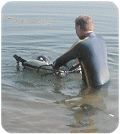 The
most commonly used method to introduce the dog to human scent under the
water is with a scuba diver. The process begins by introducing the dog
to The
most commonly used method to introduce the dog to human scent under the
water is with a scuba diver. The process begins by introducing the dog
to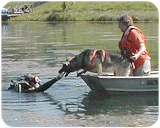 the water by swimming and riding in the boat comfortably. The diver
can start with a run away from shore and moves to shallow water and is
still visible to the dog. When the dog gives an alert, the diver rewards
him.
After this systematic approach the dog and handler then precede to the
boat, will search the area, until he can find the scent cone of the submerged
diver. When the dog alerts, then the diver is given the signal to come
up and will reward the dog. It is very important in training for the handler
to know where the scent is in order to prevent a false alert. This is when
the dog alerts in the absence of desired scent source. the water by swimming and riding in the boat comfortably. The diver
can start with a run away from shore and moves to shallow water and is
still visible to the dog. When the dog gives an alert, the diver rewards
him.
After this systematic approach the dog and handler then precede to the
boat, will search the area, until he can find the scent cone of the submerged
diver. When the dog alerts, then the diver is given the signal to come
up and will reward the dog. It is very important in training for the handler
to know where the scent is in order to prevent a false alert. This is when
the dog alerts in the absence of desired scent source. 
Any OVSAR handler
participating in water searches must obtain water training in basic boatmanship
and related water skills. Both the handler and dog must learn to be comfortable
in small boats and be strong swimmers. The handler should know basic water
reading skills. It helps to know as much as possible about the environment. |


 The
boat can travel back and forth from shore to shore. Keeping in mind the
wind direction and other weather conditions such as sun reflection, temperature
and currents of the water can affect the way the search is conducted. An
alert from the search dog makes the handler aware and the rescue divers
evaluate where to dive. It is just as important to know where not to dive.
If you can determine where the victim isn't then you have valuable information,
especially when you are searching a large area of water. In searching the
water, the dogs can only detect where the scent is emerging from the water.
The subsequent location and recovery of the victim is accomplished using
other skills and equipment, such as sonar equipment, dragging tongs and
underwater cameras.
The
boat can travel back and forth from shore to shore. Keeping in mind the
wind direction and other weather conditions such as sun reflection, temperature
and currents of the water can affect the way the search is conducted. An
alert from the search dog makes the handler aware and the rescue divers
evaluate where to dive. It is just as important to know where not to dive.
If you can determine where the victim isn't then you have valuable information,
especially when you are searching a large area of water. In searching the
water, the dogs can only detect where the scent is emerging from the water.
The subsequent location and recovery of the victim is accomplished using
other skills and equipment, such as sonar equipment, dragging tongs and
underwater cameras.
